Most Popular
Korean History
-
1
2014 ferry disaster left scars that never healed
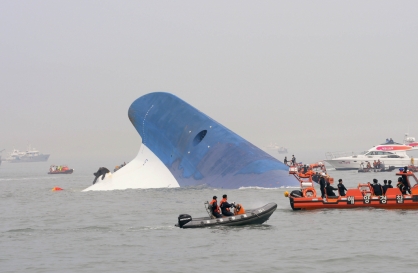
-
2
In 2012, K-pop makes leap from 'Gangnam' to the world
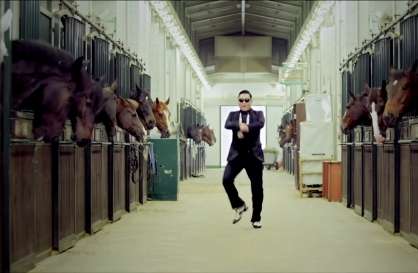
-
3
Deadly sinking of Navy ship in 2010 marks worst postwar military disaster
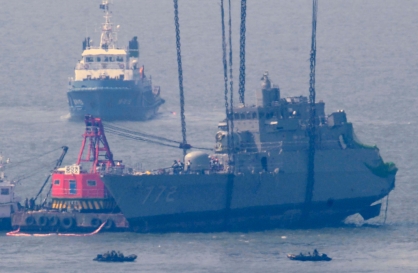
-
4
In 2008, Korea's National Treasure No. 1 went down in flames
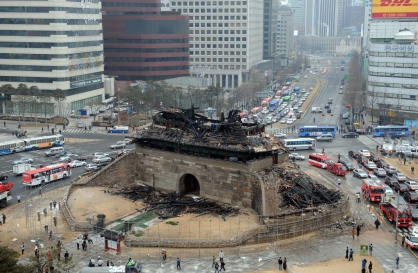
-
5
In 2005, science world’s biggest scandal unravels in Seoul
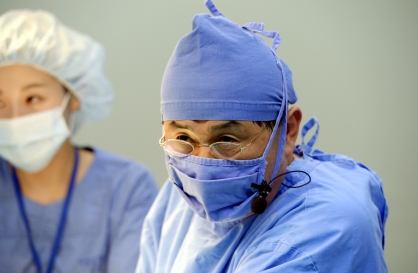
[Korean History] 2002, when Korea soared through World Cup
S. Korea’s improbable run to final four foreshadowed rising status in sports world in years to follow
By Yoon Min-sikPublished : Oct. 4, 2023 - 16:49
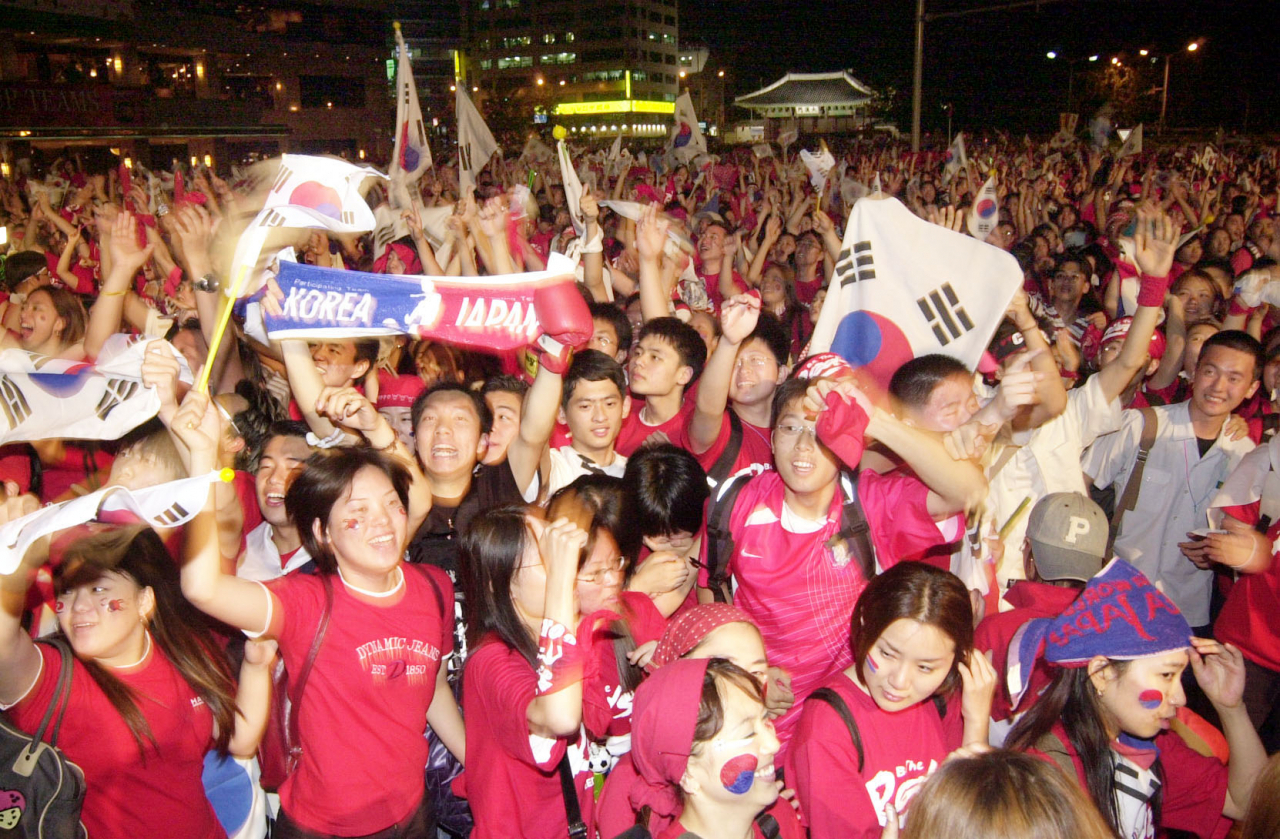
The dawn of the 21st century was not the brightest of days for South Korea, still hampered by the 1997 Asian financial crisis, which cost thousands their jobs and bankrupted companies across the country.
But in 2002, Koreans received an unexpected boost in morale when their national soccer team beat the odds to make an improbable run to the semifinals of the 2002 World Cup hosted jointly by South Korea and Japan.
The surge of the Taegeuk Warriors on the world's biggest soccer stage brought the country to a state of euphoria and national pride that is still remembered fondly today.
“There was the sense of ‘We can do it!’ that united the whole country,” said Choe Sang-hun, a former reporter at The Korea Herald, now Seoul bureau chief for the New York Times.
“Korea Triumphs,” reads the top story for the June 19, 2002 edition of The Korea Herald, which tells how the South Korean squad bested the favored Azzurri, or Blues -- referring to the Italian team -- in an overtime thriller at Daejeon World Cup Stadium to advance to the round of eight.
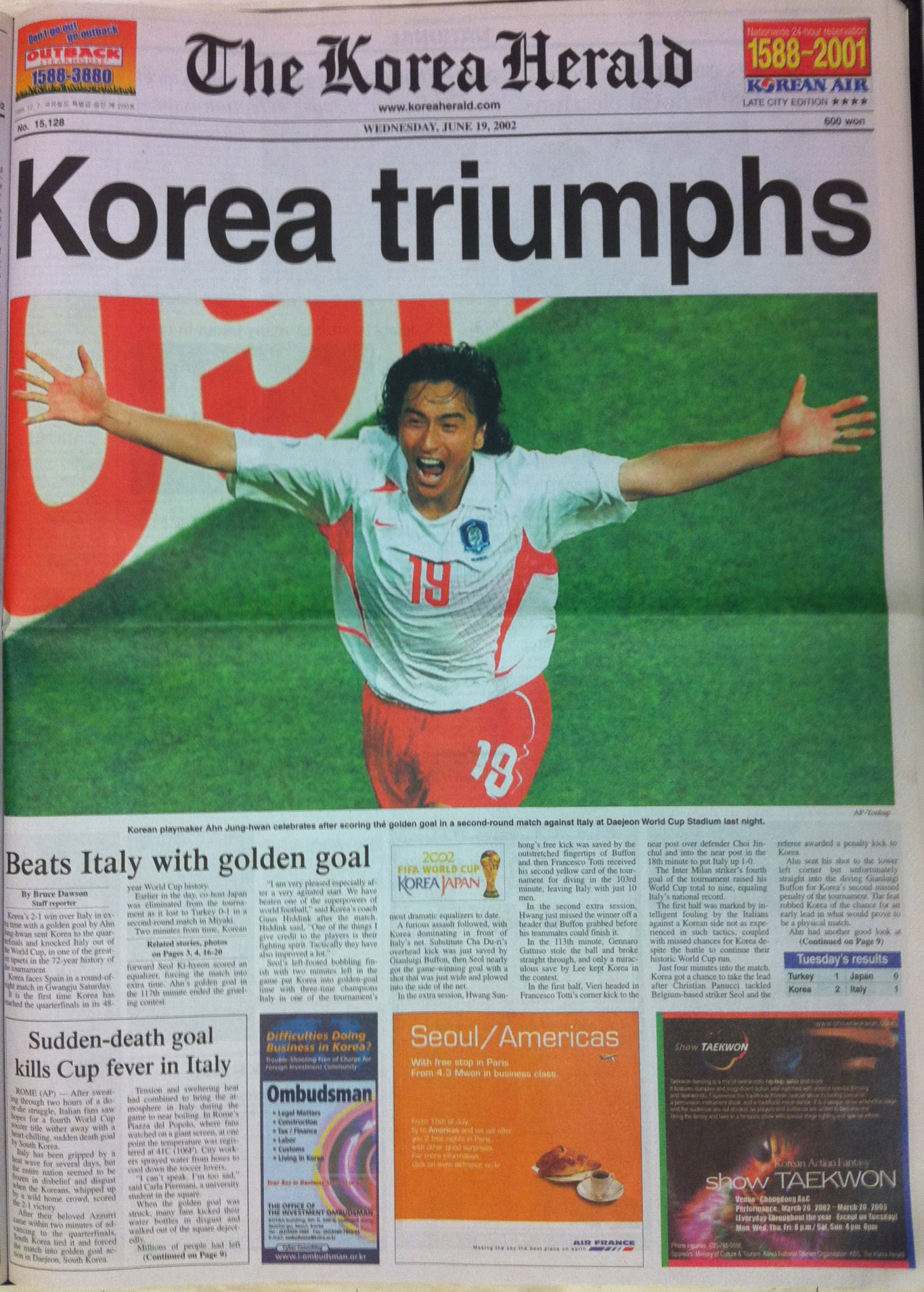
Cinderella story
Prior to 2002, the South Korean squad had not won a single game in its five World Cup outings. Korea first joined the international tournament in 1954, when it was still recovering from the 1950-53 Korean War, only to be obliterated that year by Hungary and Turkey 9-0 and 7-0, respectively.
Then in 2002, the team qualified as the top seed in Group D solely by merit of being a co-host, and its prospects remained bleak, as all of its competitors were higher up in the world rankings. Portugal, led by 2000 Ballon d’Or winner Luis Figo, was coming off its final four run in the UEFA Euro 2000, and was poised for a strong showing in 2002 on the shoulders of its “golden generation.”
But the South Korean squad came well prepared.
In the months leading up to the tournament, the team, under the stewardship of Dutch manager Guus Hiddink, underwent intense endurance training that prepared the players against stronger and overall larger players across the field.
There are several comparatively taller players on the Korean national team now -- including Kim Min-jae who stands 190 centimeters tall -- but the players back then were not so big in stature. Hong Myung-bo, the captain and eventual Bronze Ball winner of the 2002 World Cup, was a slim defender standing only 181 centimeters tall -- hardly the physically imposing type that can overpower an opposing offense.
Hiddink’s training, however, boosted the stamina of the entire team, and with Hong’s leadership, the Korean defenders swarmed the opposing superstars whenever they touched the ball.
South Korea notched its first-ever World Cup win against Poland, held the US to a draw, then upset the mighty Portuguese squad to finish first in Group D and advance to the knockout stage against Italy. Italy’s Christian Vieri scored the first goal of the match, but the Taegeuk Warriors clawed their way back with an equalizer from Seol Ki-hyeon, a mere two minutes before the end of regulation.
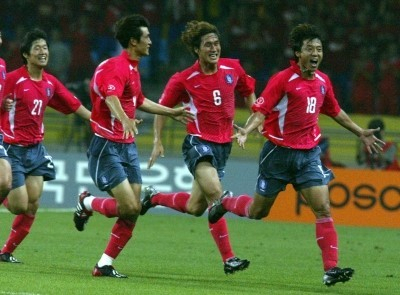
In extra time, Ahn Jung-hwan concluded with a golden goal at 116 minutes. This led to South Korea becoming the first Asian team since North Korea in 1966 to advance to the round of eight.
South Korea would face two more contenders in the next two rounds. The team survived a grueling 120-minute match against Spain, barely escaping 5-3 in the penalty shootout, but the team would ultimately fall to Germany in the semifinals.
Lee Min-ho, a 36-year-old resident of Incheon who was in high school at the time, said soccer was all his classmates would talk about. “Even those who usually were not that into soccer would go on about sports. After we got eliminated by Germany, there was a rumor that the Germans were disqualified for doping and we would go on to the finals after all."
“In hindsight that was absurd, of course. But that’s just how excited we all were.”
Korea fell to Turkey in the consolation playoff for third place, ultimately finishing fourth, which to this day remains its best result in the World Cup ever.
World Cup festivities boost nation’s morale
The financial crisis in the 1990s dampened the spirits of Koreans, who had prided themselves on propelling rapid economic growth in the latter part of the 20th century, dubbed the "miracle on the Han River."
There were even talks of South Korea forfeiting its right to host the 2002 World Cup in the aftermath of the financial crisis. Chung Mong-joon, then-head of the Korea Football Association, formally denied such suspicions in May 1998, saying that the construction of World Cup stadiums would be carried out as scheduled.
Despite lingering doubts, the World Cup gave South Korea among its happiest memories theretofore in recent history.
Jo Jin-woo, a 40-year-old who in his first year of college in Seoul at the time, clearly remembers going to Gwanghwamun Square to cheer for the national team at a World Cup screening event. That World Cup was the first time screening events for sports were held in public areas here on such a mass scale.
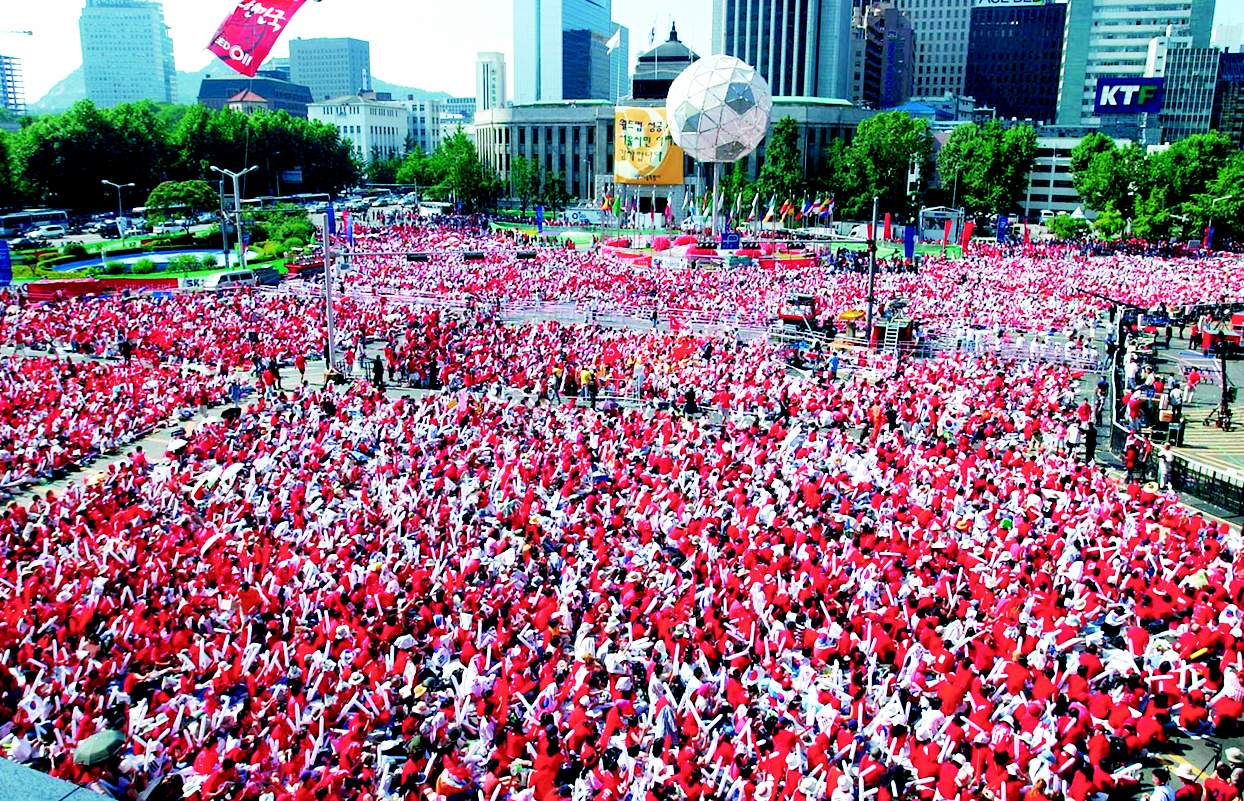
“I went there with my friends, and I’ve never seen anything quite like it. When we scored the goal (against Poland), everyone was beside themselves, hugging strangers and cheering like crazy,” he said. Even when he was watching from home, Jo clearly remembers hearing everyone in his apartment complex erupt in cheers when Hong scored the winning goal against Spain.
According to the archives of the National Institute of Korean History, roughly 500,000 Koreans had gone to public screening events for the first qualifying match against Poland. By the time South Korea was facing Germany in the semifinals, the number had surged to over 2 million.
Jo recalled how he and his friends would go to bars before and after matches to drink and celebrate, during which they would madly discuss the details of the World Cup.
Alcohol consumption in 2002 jumped 9.1 percent from the year before, according to the National Tax Service, backing up the testimonies of many who recall nearly all the bars in populated areas being jam-packed during the event.
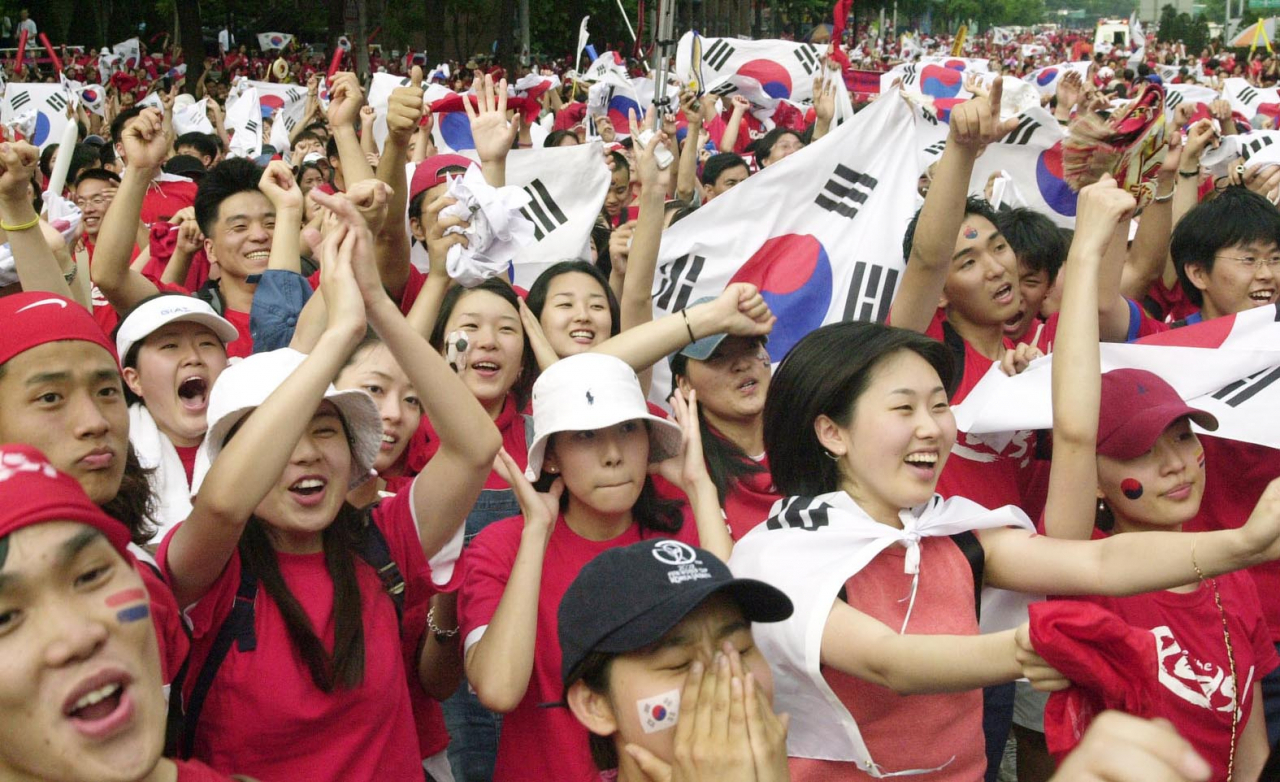
Korean soccer’s status receives boost
Up until 2002, Cha Bum-kun -- who played in Germany's Bundesliga in the 1970s and 1980s -- was practically the only Korean soccer player of international caliber. Despite his achievements, he was considered an outlier rather than the norm, since the rest of Korean soccer seemingly remained a nonfactor in the eyes of outsiders.
This situation changed when international clubs, including top-tier teams in Europe, started recruiting members of the 2002 squad. Manager Hiddink, who was from the Netherlands, recruited two of his 2002 players -- midfielder Park Ji-sung and left back Lee Young-pyo -- to play for him at PSV Eindhoven in the Dutch soccer league, Eredivisie.
Park went on to become the first Korean to play in the English Premier League when he joined Manchester United in 2005, and remains among the most accomplished Korean soccer players today. His former PSV teammate, Lee, also ended up playing in the EPL, joining Tottenham Hotspur later in 2005.
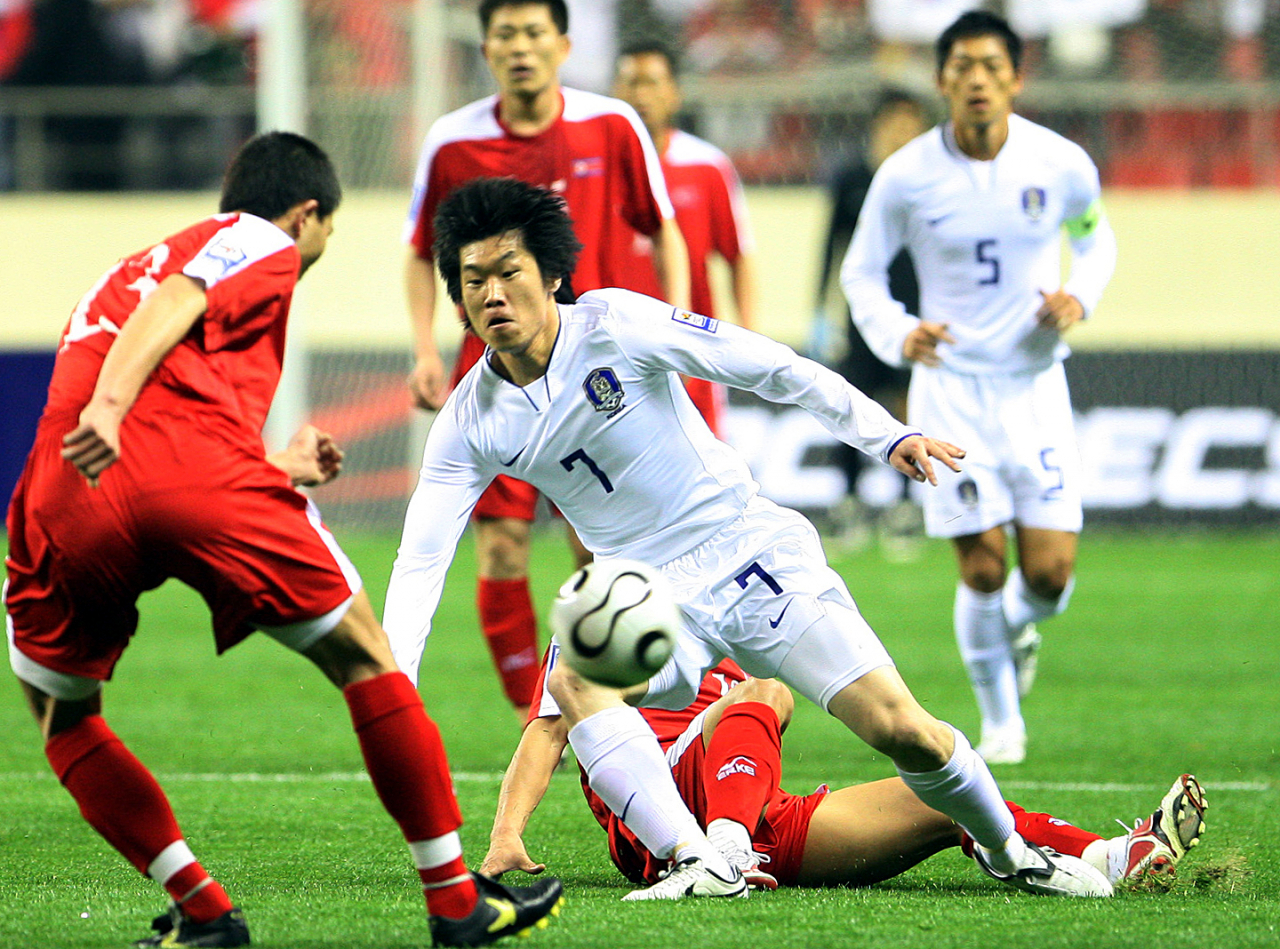
The 2002 World Cup paved the way for the next generation’s success in Europe. A total of 15 Koreans have now played in the top English league to date, including Tottenham’s Son Heung-min, who is considered by consensus the most successful Korean soccer player of all time. Son was 11th in the Ballon d’Or 2022 voting, and is the only among his compatriots to be shortlisted for the award twice.
In additional to Park and Lee, 2002 midfielder Song Jong-gug was recruited by a Dutch club immediately after the World Cup, and team captain Hong signed with the LA Galaxy of Major League Soccer in the US.
South Korea has had its ups and downs on the world stage since 2002, but its status has never fallen to that of the doormat it was before.
The national team has logged at least one win in every World Cup since then, except for in 2014 when the team finished in abysmal 27th place. Twice the team has reached the round of 16 -- 2010 and 2022 -- and in 2018, it shocked the world by eliminating defending champion Germany in the final match of the qualifying round.
While still never a contender for the top prize at the World Cup, the South Korean squad is considered a solid team and a legitimate threat for even the top hopefuls on the international stage. Such status can be traced back to 2002, when the Taegeuk Warriors shocked the world by beating three championship contenders in Portugal, Italy and Spain.
























![[Today’s K-pop] Treasure to publish magazine for debut anniversary](http://res.heraldm.com/phpwas/restmb_idxmake.php?idx=642&simg=/content/image/2024/07/26/20240726050551_0.jpg&u=)